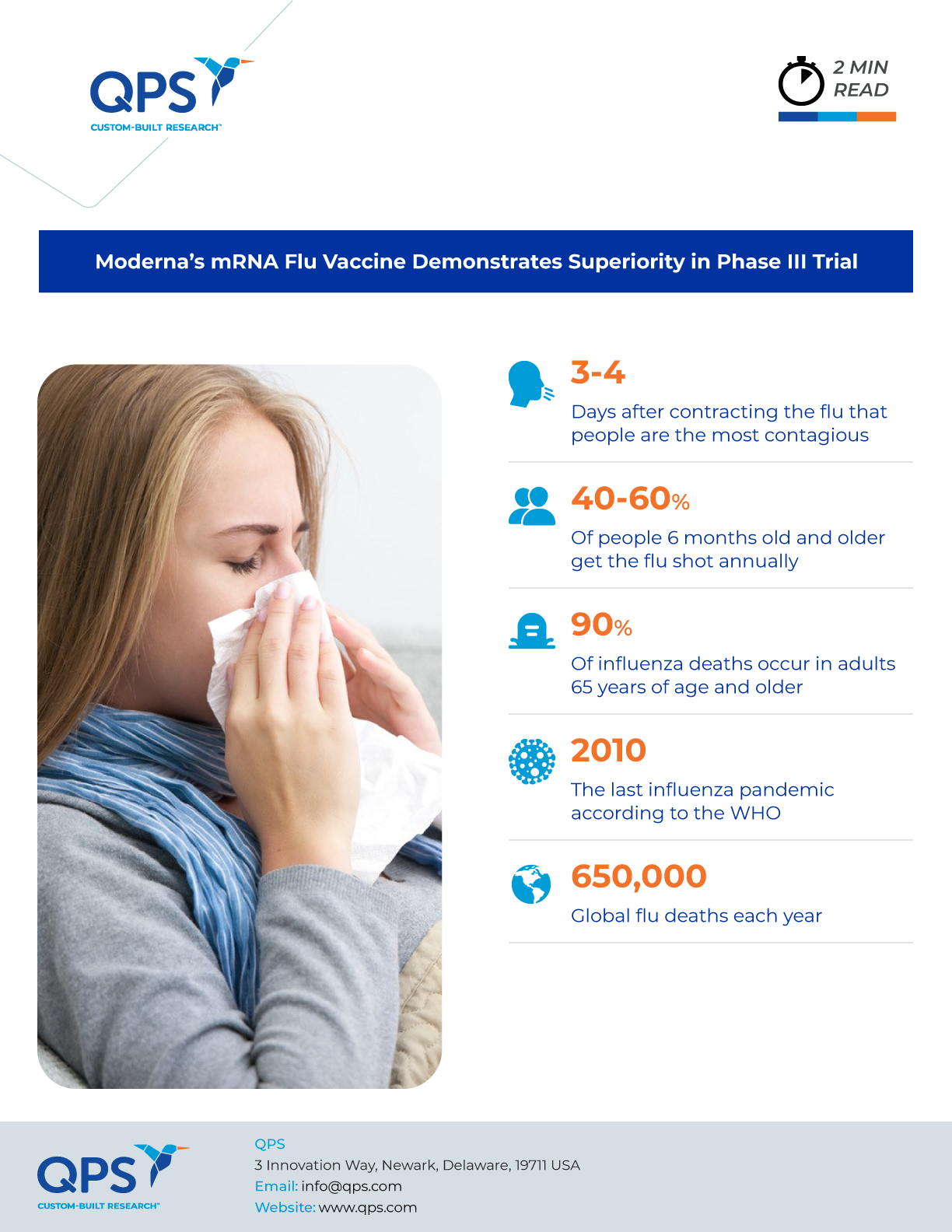Moderna has announced positive interim results from the Phase III trial of its updated mRNA-1010 influenza vaccine. The company reported that the vaccine met all primary endpoints and demonstrated superiority when compared to GSK’s Fluarix. For all four influenza strains (two each for influenza A and B) recommended by the World Health Organization, mRNA-1010 resulted in higher antibody levels and higher seroconversion rates than those observed with Fluarix. In a separate Phase I/II head-to-head study, the vaccine showed improved immunogenicity across age groups and in older adults. Furthermore, the reported local and systemic side effects were similar to those in previous mRNA-1010 studies.
Improved Outcomes
A previous version of the vaccine hit a stumbling block. During the Phase III trial in the Northern Hemisphere, the company announced that the vaccine “did not accrue sufficient cases at the interim efficacy analysis to declare early success.” Specifically, it had not met the efficacy threshold against both influenza B strains.
Now, however, Moderna is ready to move forward. The company hopes to meet with regulators soon, with a potential launch as early as next year, Moderna Chief Executive Officer Stéphane Bancel reported.
Moderna’s Future mRNA Landscape
In addition to the results reported for mRNA-1010, Moderna has announced positive results from a Phase I/II trial evaluating mRNA-1083, a combination vaccine against the flu and COVID-19. The company hopes to offer combination vaccines as a more efficient immunization model for the public and healthcare practitioners. In addition to the flu vaccine and COVID-19, it may be possible to add an annual vaccine for respiratory syncytial virus (RSV) to a combo shot. A combined flu and COVID-19 vaccine could be available as early as 2025, with a potential vaccine for all three viruses launching by 2026. Moderna has submitted a biologics licensing application for an RSV vaccine and noted that combination vaccine studies only need to show safety and tolerability if each component has received approval for its efficacy.
In addition, Moderna has completed adult enrollment in the Phase III trial of mRNA-1647, a vaccine against cytomegalovirus vaccine (CMV). Bancel anticipates results within a year, highlighting the company’s commitment to tackling complex viruses. In total, over the next five years, Moderna reported that it expects to launch up to 15 new products addressing high unmet needs, to bring up to 50 new candidates into clinical trials, and to continue expanding the field of mRNA into new applications.
Global Health Challenges and More
Moderna is also engaged in vaccine development for Lyme disease and Zika virus. Discussions with regulators for a Phase II safety trial for the Zika vaccine are underway, aiming to use antibody levels in animals as an approval pathway. The company has also started a Phase I/II trial to evaluate the safety and efficacy of two potential mRNA vaccines against Lyme disease. Moderna also expects to conduct a Phase I/II study of a mpox vaccine but remains cautious and is not rushing into a Phase III trial.
In conclusion, the success of Moderna’s mRNA-1010 in the Phase III trial is a significant step forward in the fight against the flu and a demonstration of the platform’s potential. “Our mRNA platform is working. With today’s positive Phase 3 flu results, along with previous results in COVID and RSV, we are now three for three on advancing respiratory disease programs to positive Phase 3 data,” said Bancel in a statement. “In the near term, we look forward to product launches in our oncology, latent, rare, and infectious disease franchises. In the fourth quarter of this year, we also expect to provide data on our next-generation COVID and flu combination, mRNA-1083, and additional efficacy analysis on our Phase 2 INT [individualized neoantigen therapy] study. With significant momentum across the business and our pipeline, we are excited by the near future and focused on execution.”
Did you enjoy this blog post? Check out our other blog posts as well as related topics on our Webinar page.
QPS is a GLP- and GCP-compliant contract research organization (CRO) delivering the highest grade of discovery, preclinical and clinical drug research development services. Since 1995, it has grown from a tiny bioanalysis shop to a full-service CRO with 1,200+ employees in the U.S., Europe and Asia. Today, QPS offers expanded pharmaceutical contract R&D services with special expertise in neuropharmacology, DMPK, toxicology, bioanalysis, translational medicine and clinical development. An award-winning leader focused on bioanalytics and clinical trials, QPS is known for proven quality standards, technical expertise, a flexible approach to research, client satisfaction and turnkey laboratories and facilities. Through continual enhancements in capacities and resources, QPS stands tall in its commitment to delivering superior quality, skilled performance and trusted service to its valued customers. For more information, visit www.qps.com or email [email protected].






